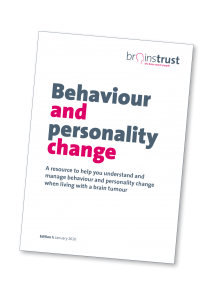Behaviour and personality change
Some children may have behaviour problems due to the stress of the illness and anger caused by missing ‘normal’ activities. These behaviour changes might improve after a little while. However, for many children, these behaviour changes can be a result of the brain tumour and treatment. Your child’s brain has changed since the diagnosis, and it continues to develop long after treatment. Therefore, some behaviour changes may not develop until your child is older.
At brainstrust, we think behaviour and personality change (BPC) is up there with fatigue when it comes to challenge. It is one of those topics for which there is no silver bullet, no magic pill. It makes everyone feel disempowered, helpless and daunted. We know that up to 60% of people diagnosed with a brain tumour experience BPC, and we also know that there is little support available for this.
With children, their behaviour may be different at school and at home, so give it a little bit of time to adjust following treatment. If challenges persist with behaviour, talk to your child’s healthcare team. Occupational therapists are great at providing support with this. Also, speak to your child’s school to see if your child could access additional support at school.
Causes of BPC
Sometimes BPC is due to the tumour itself. Brain tumours can cause a variety of symptoms. These can be neurological symptoms (headaches, dizziness, loss of speech or movement) or behavioural changes (changes in the way people act). These changes can be due to the brain tumour or the treatment for the brain tumour. Changes in behaviour, personality and cognition could be related to the type of tumour, its location, size and rate of growth or grade. For example, a brain tumour can cause a person to be disinhibited – to behave in ways that are completely out of character and at times inappropriate.
Treatment can also cause BPC. Radiotherapy, surgery, medication, chemotherapy – all of these can have an impact.
Thinking ability (cognition) is also a key part of behaviour and personality change. Cognition includes how we think, what we remember and how we reason, or make decisions. You may have heard the words ‘cognitive deficit’ being used. This refers to a loss of cognitive ability – for example, a loss in the ability to make a reasoned judgement, or not being able to do more than one thing at a time.
Our BPC resource is designed for adults. However, as a parent, it may be worthwhile reading it. Download your free digital copy of the behaviour and personality change resource here and your mood journal template here. You can pre-order a hard copy of the resource by emailing Charlotte.






